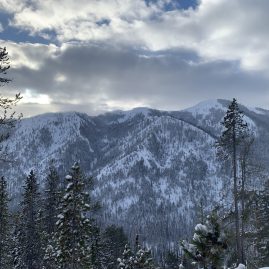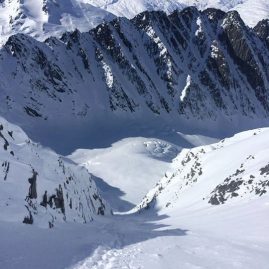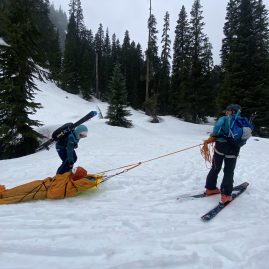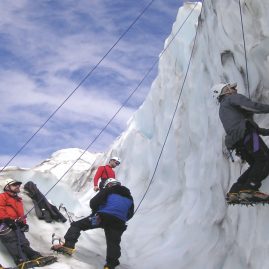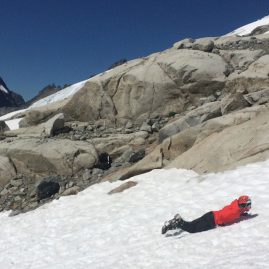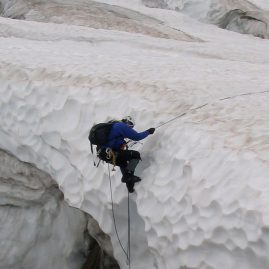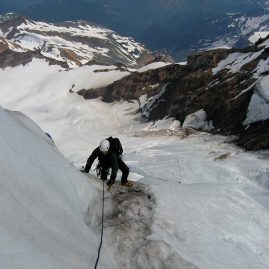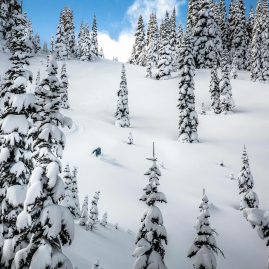
- Dates: Custom
- Duration: 5 hours
- Level: Beginner
- Client Ratio: 6:1
- Cost:
- 1-Day $295
- Included: Group climbing equipment (ropes, protection, and carabiners) and guide services.
- Not Included: Transportation, helmets, harnesses, rock shoes, gratuities for guides, and all personal items. A detailed equipment list will be sent to all participants.
Partners with Vertical World to bring Outdoor Climbing Skills to the Gym Experience! This course is perfect for climbers who know how to top-rope indoors and are looking to transition from the gym to outdoor climbing or simple those new to the sport. The course emphasizes climbing practices, building fundamental outdoor climbing skills, and understanding the differences between indoor and outdoor environments.
What You’ll Learn:
- Overview of climbing gear: helmets, harnesses, belay devices, carabiners, and ropes.
- Basic rope handling, knots, and belay techniques.
- Proper top-rope setup and anchor evaluation.
- Effective climbing movement on outdoor rock.
- How to clean sport anchors and lower.
- Reading guidebooks.
- Outdoor practices (yelling rock and what to do, how to manage your gear in the space allotted, sharing space with others)
Leave Seattle at or at 2 PM to Exit 38 depending on conditions and the pace of the group, we will do 3 to 5 climbs and cover a variety of techniques.
DAY 1
- Overview of climbing gear: helmets, harnesses, belay devices, carabiners, and ropes.
- Basic rope handling, knots, and belay techniques.
- Proper top-rope setup and anchor evaluation.
- Effective climbing movement on outdoor rock.
- How to clean sport anchors and lower.
- Reading guidebooks.
- Outdoor practices (yelling rock and what to do, how to manage your gear in the space allotted, sharing space with others)
We pack up by 2 or 8 and drive home.
Climbing Gear
-
-
- Climbing Helmet: Lightweight
- Rock Climbing Harness: Padded and adjustable.
- Belay Device: Petzl Grigri and/or Tube style belay device ie BD Guide ATC
- Cord: 6 mm, 21 feet
- Nylon Slings: (1) 60 cm nylon sling, (1) 120 cm nylon sling
- 4 Locking carabiners 2-Large, pear-shaped carabiners; 2- Medium pear-shaped, screw gate locking carabiners.
- 2 Regular carabiners (e.g. Wire-gate are recommended)
-
Upper Body
-
-
- Synthetic T-shirt
- Long sleeve polypropylene shirt Lightweight, light colored for sunny days
- Sports bras Two, synthetic, no cotton!
- Shade hat or baseball cap
-
Lower Body
-
-
- comfortable pants or leggings (shorts are fine just recommend covering your knees to avoid abrasions )
-
Backpack
-
-
- Internal frame pack 2000 cubic inch capacity
-
Miscellaneous Equipment
-
-
- Sunglasses 100% UV protection with side shields or wrap around.
- Personal first aid repair kit Basics: moleskin/blister kit, Band-Aids, first-aid tape, ibuprofen, personal medications etc.
- Lip balm At least SPF 20
- Sunscreen At least SPF 40
- 2 water bottles 1 liter wide-mouth Nalgene and 1 bottle holster, or
- Bandana
- Hand wipes
- Favorite snack foods (no more than 2 pounds)
-
WHO WILL MY GUIDE (OR GUIDES) BE?
We are small company who enjoy working together in the mountains as well as highly skilled professionals who hold current Wilderness First Responder certification and are proficient in technical rescue and evacuation skills. Our guides are dedicated to the world of alpinism, many having first ascents and hold professional certifications with the AMGA in the rock, alpine, and ski disciplines. The AMGA is part of the IFMGA, which is the international body of certified mountain guides.
HOW MUCH SHOULD I TIP MY GUIDES?
Tipping is considered standard practice in the guiding industry. Tipping amounts vary – so $20-30 per day per person/per guide is average that works well for the guides without a serious blow to your wallet. Often 10% of the course cost is a good rule-of-thumb. If you feel that the program was exceptional or substandard the tip can reflect that.
CAN I RENT EQUIPMENT FROM BCAG?
No, for these trips we strongly suggest to buy your equipment due to obscenely large rental costs for trip of this length.
HOW HEAVY WILL MY PACK BE?
Day trips will keep your pack between 10-15 pounds max.
WHEN DO I NEED TO PAY THE BALANCE OF MY TRIP?
For Scheduled Domestic Courses and Climbs: Your balance is due 60 days from trip departure. Payable by check, Credit Card with service charge or Venmo.
WHAT HAPPENS IF I NEED TO CANCEL MY TRIP?
If you should decide to cancel your trip, BCAG must be notified in writing. Your trip will be cancelled from the date we receive written notice. You will be assessed a cancellation fee according to the following schedule:
90 to 31 days from trip departure – 50% of trip cost
30 days or less – 100% of trip cost
WHAT HAPPENS IF BC ADVENTURE GUIDES HAS TO CANCEL MY TRIP?
In the rare circumstance where we need to cancel a program you can reschedule without a fee or receive a refund on your deposit. If circumstances arise that force us to cancel a program that is already in progress, we reserve the right to decide whether a refund or credit, at a prorated rate, will be issued. We are not responsible for cancellation fees or costs arising from your changed or cancelled flights, lodging, or other arrangements. We strongly recommend obtaining trip cancellation insurance from your travel agent.



